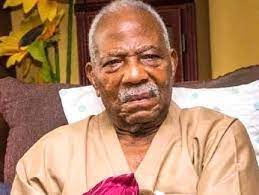President Bola Tinubu visited Owo o Wednesday to condole with the family of the late Governor of Ondo state, Arakunrin Oluwarotimi Akeredolu, SAN, CON.
The President, accompanied by Chief Bisi Akande and Chief Pius Akinyelure, was received by the widow of the late governor, Chief Betty Anyanwu-Akeredolu.
During the visit, the President, who had a closed-door meeting with Mrs. Akeredolu, also visited where the late governor was laid to rest.
Ondo state governor, Lucky Aiyedatiwa, and his deputy, Chief Olayide Adelami, were also at the Akeredolu’s residence.
In a similar development, the president during a visit to Chief Reuben Fasoranti, the Afenifere leader at his residence in Akure , appreciate the support of the leaders and Yorubas during the election.
Chief Fasoranti in his speech welcome the President and his team, saying your performance so far has shown that you understood the full gravity of your mandate which is to show the Nigerian people that a good government is possible.
He added that it is now incumbent for the president to address this issue of constitutional reforms with courage, fairness and determination. We know we cannot return to the past, but we have to seek a future where regional competitions would bring out the best in our country as it did during the First Republic.
We seek therefore a true Federal Republic that would reflect fiscal federalism. If derivation principle is good for oil, why is it not good for Value Added Tax for example? We believe a review of the 2014 National Constitutional Conference would help you in charting the course.
For the people of the South-west, restructuring also has a more pressing meaning. Today, Nigeria has a population of 200 million which would double in the next 25 years to 400 million.
However, the South-West is facing an avalanche of migration from the other zones of the country to the extent that in 25 years’ time, if the current trend continues, the South-West would be home to 50 percent of the population of Nigeria.
By this time the states of Ekiti, Lagos, Ogun, Ondo, Osun and Oyo would be home to at least 200 million people. We need to plan for this eventuality on a regional scale. We need to be prepared so that our region would not be overwhelmed by imported challenges.




